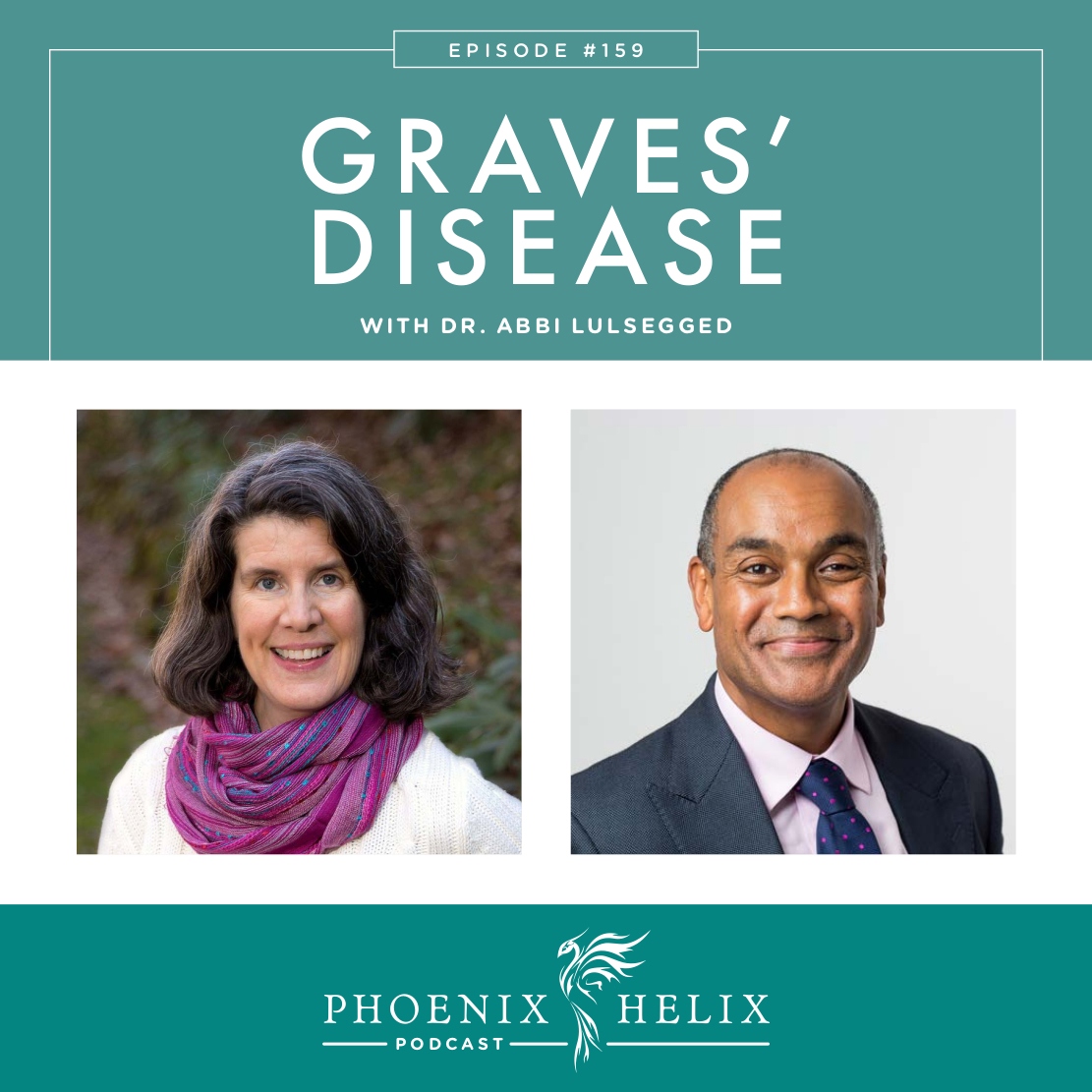Graves’ Disease Spotlight
Most of my podcast episodes focus on autoimmune health in general, with information that can help all of us regardless of diagnosis. But I also enjoy doing occasional diagnosis spotlights. This is where we take a detailed look at one particular autoimmune disease. Today, we’re focusing on Graves’ Disease. When it comes to thyroid autoimmune disorders, we hear a lot more about Hashimoto’s in the paleo autoimmune community. Yet Graves’ Disease is also one of the most common autoimmune diagnoses. It affects millions of people around the world. My guest is Dr. Abbi Lulsegged, a functional endocrinologist practicing in London, UK with over 25 years of clinical experience. He believes strongly in investigating the root causes of a patient’s problems and treating people holistically.
Listen to the Show
- Subscribe to my podcast through your favorite podcast app: iTunes, Stitcher, Google, TuneIn, Spotify, Amazon, etc.
- You can also listen to the episode right here through the player below, and if you subscribe to my newsletter you’ll get notified of future episodes.
Podcast: Play in new window | Download
Show Notes
- Intro (0:00)
- Thank You to Our Podcast Sponsor: ShopAIP (3:07)
- Today, I’m highlighting EPIC. They were the first company to come out with an AIP-friendly protein bar (Bison Bacon Cranberry). Since then, they’ve expanded their product line to include other bars, meat bites, flavored broths, healthy fats, pork rinds, and more. ShopAIP sells it all! There are 14 items that you can enjoy during the elimination phase of the AIP. In addition to their bison bar, there’s a Beef Apple Bacon Bar, a Wild Boar Bacon Bar, a Smoked Maple Bacon Bar, and Smoked Salmon Maple Filet Strips. And if you’ve reintroduced black pepper back into your diet, I also love their Venison Bar and their Beef Liver Bites.
- ShopAIP is an online store dedicated to the Paleo Autoimmune Protocol. With hundreds of items for the elimination phase of the AIP, and new products labeled by reintroduction category as well. You can find protein bars, sauces and condiments, AIP-friendly spices, cooking and baking ingredients, delicious snacks, non-toxic skincare, and more.
- If you’re a first-time customer, use the code PHOENIX for 10% off your order. Purchase here.
- Meet Dr. Lulsegged (4:45)
- Dr. Abbi Lulsegged is a functional endocrinologist practicing in London, UK with over 25 years of clinical experience.
- Endocrinology is a specialty that requires knowledge of all systems of the body, since symptoms are so widespread. Dr. Lulsegged loves that challenge. He sees himself as an armchair detective, trying to find the cause behind each patient’s unique set of symptoms.
- He discovered functional medicine personally in 2007. Vitamin D supplementation eliminated his body aches and pains, and a low-carb diet led to healthy weight loss. He was excited and intrigued, but dove into the research to see if there was science behind his personal experience. He found numerous studies and ended up getting trained through the Institute for Functional Medicine. He now combines conventional and functional medicine when treating his patients, with great results.
- What Is Graves’ Disease? (9:42)
- Graves’ Disease is an autoimmune disease that causes an overproduction of thyroid hormones. Normally, this production is tightly regulated by the brain. The pituitary gland releases TSH (thyroid stimulating hormone) when needed, which stimulates the thyroid to produce the hormones T3 and T4. In Graves’ disease, the immune system attacks the TSH receptors on the thyroid and changes how they function, causing them to over-respond. It’s like being a speeding car with the gas pedal pressed to the floor. It speeds up numerous functions in the body in a dangerous way.
- Symptoms of Graves’ Disease (12:07)
- Many Graves’ disease symptoms overlap with other health conditions, making diagnosis difficult.
- The three most common symptoms that delay diagnosis (because they’re thought to be the sole problem rather than a symptom or something larger) are anxiety, menopause, and stress.
- Other common symptoms include heart palpitations, increased bowel movements, tremors, unintentional weight loss, heat intolerance, excessive sweating, irritability, lighter & more frequent periods, and miscarriages.
- Thyroid eye disease (ophthalmopathy) is present in 1/3 of patients. This is inflammation of the tissues around the eyes causing a bulging appearance.
- Two other rare symptoms that are specific to Graves’ disease are swelling of the skin over the shins and clubbing (puffing) of the fingernails.
- When sharing symptoms with your doctor, be thorough. Many people feel uncomfortable discussing psychiatric symptoms, but research is showing these are often physiological problems. Thyroid issues can be a root cause of mental disorders. Dr. Lulsegged is actually doing research in this area.
- Graves’ Disease and Pregnancy (22:10)
- Undiagnosed and untreated Graves’ disease often leads to miscarriage. If you have Graves’ disease and plan to have a baby, it’s important to speak with your endocrinologist in advance. Your thyroid health needs to be stable, to support a healthy pregnancy. There will also be careful decisions regarding treatment during pregnancy. And the risk of Graves’ disease symptoms increases in the postpartum period, so that needs to be monitored closely as well.
- How Is Graves’ Disease Diagnosed? (24:07)
- Detailed health history.
- Blood tests: TSH, Free T4, Free T3, and TSHR (the receptor antibody that indicates autoimmune activity).
- Conventional Medical Treatment (24:49)
- The first line of treatment is beta blocker medication. This doesn’t treat the thyroid, but it immediately lessens many of the symptoms of Graves’ disease.
- Simultaneously, people are prescribed an antithyroid drug. These take 4-6 weeks to feel the effects, which is why a beta blocker is given at the same time. These are prescribed in one of two ways: titration or block-and-replace. Titration is more commonly used in the USA. Dr. Lulsegged prefers block-and-replace, because thyroid levels remain very stable.
- Medication for Graves’ disease is unique in that it’s a short-term treatment, usually given for 12-18 months and then discontinued. The patient is then monitored to see if their thyroid levels remain stable, or if they experience a relapse. About 50% of patients experience a relapse within the first year, and only 30% maintain long-term remission.
- If antithyroid medication is ineffective, two other permanent treatments for Graves disease’ are radioactive iodine or surgery. With both of these treatments, patients then take thyroid replacement hormone for the rest of their lives.
- Unfortunately, no matter the treatment, remission doesn’t guarantee a restored quality of life. Research shows that even when lab values look “normal”, some patients still suffer. This is where Dr. Lulsegged believes functional medicine can play an important role.
- Thank You to Our Podcast Sponsor – Paleo on the Go (36:41)
- A frozen meal delivery service, 100% of their menu is compliant with the elimination phase of the paleo autoimmune protocol (AIP). They have over 5o items, including entrees, side dishes, broth, AIP-friendly bacon, and desserts.
- Use the code PHOENIX for 10% off your first order.
- Functional Medicine Treatment (38:20)
- Dr. Lulsegged uses an integrative approach, combining conventional and functional medicine.
- Functional medicine doesn’t just treat symptoms, but looks for root causes, including the environmental triggers that drive autoimmunity. Our genes are only part of the picture. We each have genetic vulnerabilities to certain diseases, but that doesn’t mean we’ll get those diseases. Epigenetics are the forces that influence the expression of our genes.
- Here are the environmental (epigenetic) factors which Dr. Lulsegged sees most frequently in his practice. He calls them the “elephants in the room”:
- Gastrointestinal: Celiac disease and gluten sensitivity can both by driving factors of autoimmune disease and chronic inflammation. Infections can be as well. And the health of the microbiome plays an essential role in the health of the immune system.
- Stress: The physiological stress response helps us in a crisis. It allows us to act quickly and respond via fight or flight. Chronic stress is the problem, when our body is stuck in a stressful state long-term. It increases the risk for developing autoimmune disease, and is also a common trigger of autoimmune flares.
- Blood Sugar: Fluctuations between high and low blood sugar increase the stress response and increase inflammation. This is why Dr. Lulsegged often recommends a low-carb diet to his patients.
- Nutrients: Vitamin D plays a major role in regulating the immune system. Anti-oxidants help dampen the inflammation caused by autoimmunity. Selenium is particularly important in Graves’ disease patients, because it protects against thyroid eye disease.
- Functional Medicine Testing (45:52)
- Dr. Lulsegged takes a detailed health history with every patient, to see which environmental factors may be part of their clinical picture, and he will recommend tests accordingly, keeping patient finances in mind. There is no one battery of tests that he runs on every patient.
- But he’s also clear that this is the patient’s choice. Conventional treatment is automatic. Functional medicine treatment is recommended, but optional. Some patients are interested in functional medicine right away, while others become interested later. He explains that the goal is two-fold: to address the root cause, and to improve their overall quality of life beyond what medication addresses.
- Graves’ Disease and Mental Health (48:13)
- A common side effect of Graves’ disease is agitation, anxiety, and irritability. It’s a direct result of the overproduction of thyroid hormones and usually improves once those hormones have stabilized. Dr. Lulsegged welcomes his patients to bring their loved ones to their medical appointment, so he can explain the connection. He’s careful not to excuse bad behavior, but he finds it helpful for everyone to know the cause of the irritability, and that there’s an end in sight.
- Recommended Diet for Graves’ Disease (49:28)
- There is no one-size-fits-all approach. Dr. Lulsegged personalizes diet & lifestyle recommendations to each patient.
- However, he does find that many of his autoimmune patients benefit from a gluten-free, dairy-free, low-carb diet.
- As part of his health history, he also asks about eating disorders, and he’s cautious about restricting anyone’s diet with that history without the help of a nutritionist.
- Supplements (51:43)
- These are also personalized to each patient, but there are some that are often beneficial.
- Vitamin D to help regulate the immune system.
- Selenium which research shows may be protective in Graves’ disease.
- Adaptogens to help moderate the stress response.
- Antioxidants.
- Essential Fatty Acids to help reduce inflammation.
- Probiotics, Prebiotics, and Digestive Support (based on stool testing).
- Glutathione.
- But again, it’s more complex than just giving people a list of possibilities. Each patient has unique needs.
- Improvements Through Functional Medicine (53:30)
- In Dr. Lulsegged’s clinical practice, most patients improve very quickly when functional medicine is combined with conventional treatment. This includes a faster reduction in symptoms and antibodies.
- Some patients improve dramatically. For the ones that don’t, it tends to reduce enough symptoms that it’s easier to diagnose underlying health issues.
- He can’t promise remission, because every patient is unique with a wide variety of root causes. But Dr. Lulsegged doesn’t give up on his patients. He continues his detective work, always with the goal of improving each person’s quality of life.
- Can You Treat Graves’ Disease Without Medication? (56:51)
- Dr. Lulsegged doesn’t recommended trying to avoid medication altogether. Graves’ disease can be life-threatening. He’s only had two patients die of Graves’ disease, and they both refused the medication.
- As a functional medicine physician, he only prescribes medication when it’s very important to the person’s health. With Graves’ disease, he believes in an integrative approach, combing conventional and functional medicine for the best health outcome.
- Outro (1:01:05)
- Dr. Abbi Lulsegged is accepting new patients in the UK. He’s also available to offer a second opinion to people worldwide via telehealth. However, Graves’ disease is best treated in person, so everyone should have a local doctor for their primary treatment. You can email his office for more information: [email protected].
- Eileen (your podcast host) is the author of multiple books, written to help people thrive with autoimmune disease. Learn more on the Books Page.
- If you like this podcast, follow or subscribe through your favorite podcast app. You can also subscribe to Eileen’s biweekly newsletter.
- Check out the entire archive of podcast episodes.
You May Also Be Interested In
Spreading the Word
If you like the podcast, please leave a positive review in iTunes. It would mean the world to me, and also helps others find the podcast. Here are some quick instructions using your iPhone:
- If you are already subscribed to my podcast: (1) Click the purple podcast icon. (2) At the bottom of the screen, click Library. (3) At the top of the screen, click Shows. (4) Click the Phoenix Helix podcast image. (5) Scroll down the page, and you’ll see Ratings and Reviews. Scroll down a little bit more and click on Write a Review. This will bring up the review screen. Tap 5 stars (if you love the podcast), and then click in the title box, and it will bring up the keyboard. Enter a title and short review. (6) Click Send in the upper right corner. (7) Thank you! Positive reviews give the podcast a higher search ranking in iTunes, helping people find it and letting them know it’s a quality podcast and worth their time to listen.
- If you haven’t subscribed to my podcast: (1) Click the purple podcast icon. (2) In the lower right corner, click the magnifying class. (3) Type Phoenix Helix in the search box. (4) Click the podcast cover in the Show list. (5) If you’d like to subscribe, click the + sign at the top of the screen. (6) To write a review, scroll down the page, and you’ll see Ratings and Reviews. Scroll down a little bit more and click on Write a Review. This will bring up the review screen. Tap 5 stars (if you love the podcast), and then click in the title box, and it will bring up the keyboard. Enter a title and short review. (7) Click Send in the upper right corner. (8) Thank you! Positive reviews give the podcast a higher search ranking in iTunes, helping people find it and letting them know it’s a quality podcast and worth their time to listen.









Thank you for the gluten free bread crumbs and shining a light on this subject. I have been listening to your show for about 4 years and you helped me kick start my long autoimmune journey. I have gone from 40 to 90-100%, depending on the day and exposures. I still don’t have a diagnosis, but I’ve had Graves Disease sitting in my basket of possibilities. This show rang every bell, I have pretty much every symptom mentioned. The one that was the biggest red flag is the blurred vision (I believe it was referred to as thyroid eye disease). I also live in a townhome with mold, that was just removed (sadly incorrectly), so I also believe that I have CIRS, as I tend to react to many chemicals, including the fertilizer they use here. Now I feel like I have something that I can set my sites on, thanks to you. You’re an Angel Eileen, I want to leave this review on ITunes, but for technical reasons, I’ve never been able to leave reviews there. Now on to finding a practitioner to help put together the rest of the pieces of the puzzle. Any chance that you can guide me to a practitioner that takes insurance?
Hi Alex. What a wonderful comment! I’m so glad you’ve made so much progress and that this podcast was helpful to you. Any endocrinologist can test you for Graves’ disease, and most accept insurance. You can check out my paleo-friendly MD list to see there is a doctor near you, but if not, a conventional endocrinologist should still be able to help.